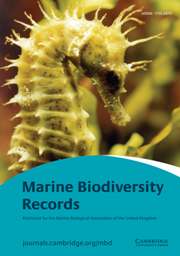Article contents
Disparity between projected geographic ranges of rare species: a case study of Echinomorpha nishihirai (Scleractinia)
Published online by Cambridge University Press: 06 October 2015
Abstract
Rare and cryptic species can be easily missed during ecological surveys of coral communities. This study reveals a disparity in the reported geographic range of a rare species, Echinomorpha nishihirai, between three different sources; none of which are wholly consistent with the available published occurrence records. Discrepancies in the species ranges reported in two comprehensive online databases are greater for rare, compared with common, coral species, suggesting a need for a more cautious treatment of rare species in biogeographic studies.
- Type
- Research Article
- Information
- Copyright
- Copyright © Marine Biological Association of the United Kingdom 2015
References
REFERENCES
- 3
- Cited by


